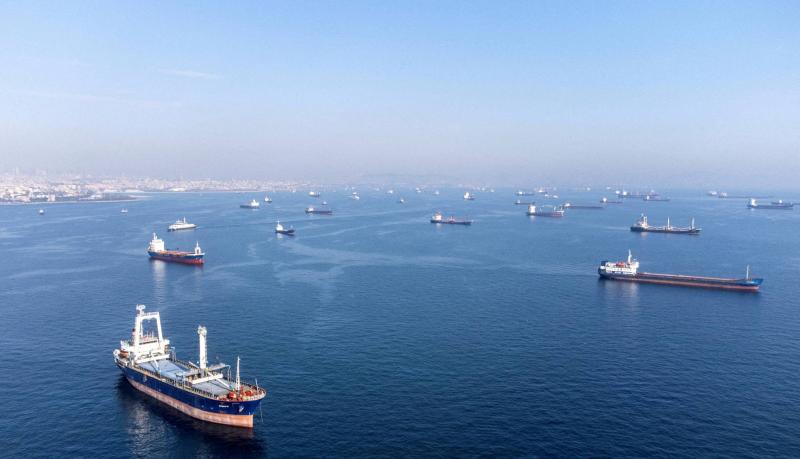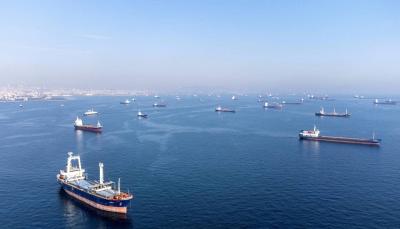Ukraine's economy has been severely impacted by the war that began in February 2022, affecting commodity markets, financial markets, trade relations, and grain exports. The disruption of supplies has led to rising commodity prices, exacerbating the global food crisis. Therefore, the "Black Sea Initiative" was launched to resume vital food and fertilizer exports from Ukraine to the rest of the world.
The Ukrainian grain export agreement, known as the "Black Sea Initiative," is a pact between Russia, Ukraine, Turkey, and the United Nations, signed on July 22, 2022, in Istanbul. Its goal is to restore Ukraine's grain exports to pre-war levels, aiming for the export of 5 million metric tons per month. The agreement includes several key provisions signed by the four parties. What are these provisions and their importance?
1. **Inspection of Ships Upon Entry and Exit**
The agreement stipulates that ships participating in the export of Ukrainian grain will be inspected upon entering and exiting the Black Sea to ensure that no weapons are carried on board.
2. **Grain Exports from Three Ports**
The agreement allows for grain exports through three maritime ports: "Odesa," "Chornomorsk," and "Yuzhne," all of which are located on the Black Sea.
3. **Safe Passage**
The agreement ensures safe passage to and from the specified Ukrainian ports, with ships tracked by a Joint Coordination Center established in Istanbul, traveling through the Bosphorus Strait to global markets.
4. **Establishment of a Joint Center for Operation Oversight and Dispute Resolution**
The agreement includes the establishment of a joint command center to oversee maritime navigation operations for ships carrying grain exports from Ukraine and aims to resolve disputes.
5. **Duration of the Agreement: 4 Months**
The parties agreed that the agreement would be in effect for 120 days, pending further renewal.
**Export of Vital Supplies**
Ukraine is one of the largest grain exporters in the world, supplying global markets with about 45 million tons of grain each year. However, following the war with Russia, large quantities of grain have been stockpiled in silos, and ships have struggled to obtain safe passage to and from Ukrainian ports as stipulated by the agreement. Ground routes have also been insufficient, leading to increased prices of basic food products worldwide, alongside rising energy costs.
On July 22, 2022, the United Nations, Russia, Turkey, and Ukraine agreed on the Black Sea Grain Initiative, allowing for the resumption of grain, food, and fertilizer exports, including ammonia, from Ukraine via a safe maritime humanitarian corridor from the three main Ukrainian ports. According to the procedures outlined by this initiative, vessels wishing to participate must undergo inspection off Istanbul to ensure they are free of cargo, before sailing through the humanitarian corridor to load at Ukrainian ports.
**What Was Exported Through the Black Sea Initiative?**
United Nations figures revealed that 50% of the cargo was corn, 28% was wheat, 11% was sunflower products, and 11% included other food items (such as canola seeds, barley, soybeans, etc.).
**How Were Grain Shipments Distributed Among Countries?**
25% of the cargo reached low-income and lower-middle-income countries. Egypt received 8%, while India and Iran each obtained 4%. Bangladesh, Kenya, Sudan received 2% each, and Lebanon, Yemen, Somalia, Djibouti received 1% each, with Tunisia getting less than 1%. About 25% of the grains went to upper-middle-income countries, including Turkey, China, and Bulgaria, while 50% went to high-income countries such as Spain, the Netherlands, Italy, South Korea, Romania, Germany, France, Greece, Ireland, and Israel.
**Russia's Threat to Withdraw**
While the continuation of shipping from the ports requires ongoing cooperation between Ukraine and Russia, Moscow has threatened to withdraw from the grain export agreement, renewing threats to the G7 group to cancel it if Russian exports are banned.
Russian Foreign Ministry spokeswoman Maria Zakharova has stated, "Moscow will not change its position regarding the compliance with all conditions of the grain deal," as reported by the Zvezda television channel.
Former Russian President Dmitry Medvedev warned that Russia would scrap the grain agreement set to expire on May 18 if the G7 moved to block the flow of exports to Russia. The G7 is considering a near-total ban on exports to Russia, with discussions suggesting that exports would be automatically prohibited unless included in a designated list of products allowed for shipment to Russia.
**Extension of the Grain Export Agreement**
In the midst of this dispute, Turkish President Recep Tayyip Erdoğan announced on May 17 the extension of the Ukrainian grain export agreement via Black Sea ports for an additional two months, a day before Russia’s potential withdrawal due to obstacles it claims are hindering its grain and fertilizer exports.
Maria Zakharova, spokesperson for the Russian Foreign Ministry, indicated that the agreement was extended to assist the needy countries, noting that Russia's overall assessment of the situation regarding the agreement "has not changed."
Ukrainian Deputy Prime Minister Oleksandr Kubrakov welcomed the extension of the grain export agreement but emphasized that it must operate efficiently. He stated on his official Facebook account, "Ukraine welcomes the extension of the grain export agreement via the Black Sea, but Russia should not be allowed to derail the agreement, and it must stop using food as a weapon and means of coercion."




